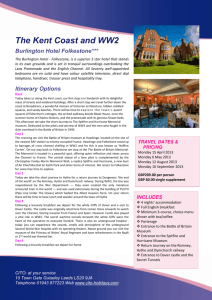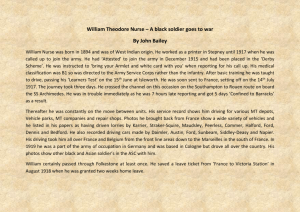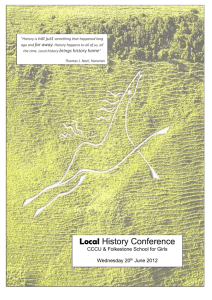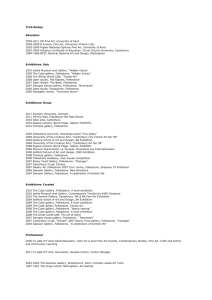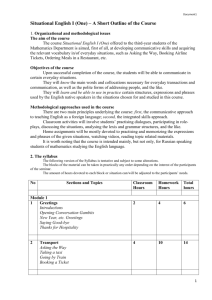dney Foster - sources
advertisement
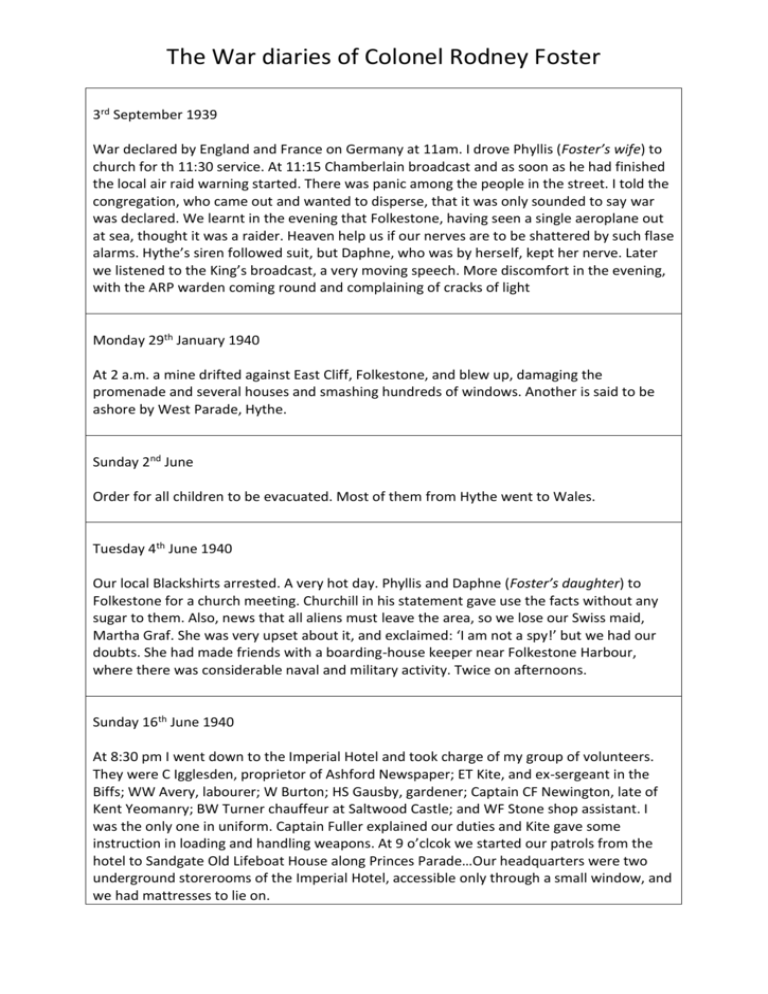
The War diaries of Colonel Rodney Foster 3rd September 1939 War declared by England and France on Germany at 11am. I drove Phyllis (Foster’s wife) to church for th 11:30 service. At 11:15 Chamberlain broadcast and as soon as he had finished the local air raid warning started. There was panic among the people in the street. I told the congregation, who came out and wanted to disperse, that it was only sounded to say war was declared. We learnt in the evening that Folkestone, having seen a single aeroplane out at sea, thought it was a raider. Heaven help us if our nerves are to be shattered by such flase alarms. Hythe’s siren followed suit, but Daphne, who was by herself, kept her nerve. Later we listened to the King’s broadcast, a very moving speech. More discomfort in the evening, with the ARP warden coming round and complaining of cracks of light Monday 29th January 1940 At 2 a.m. a mine drifted against East Cliff, Folkestone, and blew up, damaging the promenade and several houses and smashing hundreds of windows. Another is said to be ashore by West Parade, Hythe. Sunday 2nd June Order for all children to be evacuated. Most of them from Hythe went to Wales. Tuesday 4th June 1940 Our local Blackshirts arrested. A very hot day. Phyllis and Daphne (Foster’s daughter) to Folkestone for a church meeting. Churchill in his statement gave use the facts without any sugar to them. Also, news that all aliens must leave the area, so we lose our Swiss maid, Martha Graf. She was very upset about it, and exclaimed: ‘I am not a spy!’ but we had our doubts. She had made friends with a boarding-house keeper near Folkestone Harbour, where there was considerable naval and military activity. Twice on afternoons. Sunday 16th June 1940 At 8:30 pm I went down to the Imperial Hotel and took charge of my group of volunteers. They were C Igglesden, proprietor of Ashford Newspaper; ET Kite, and ex-sergeant in the Biffs; WW Avery, labourer; W Burton; HS Gausby, gardener; Captain CF Newington, late of Kent Yeomanry; BW Turner chauffeur at Saltwood Castle; and WF Stone shop assistant. I was the only one in uniform. Captain Fuller explained our duties and Kite gave some instruction in loading and handling weapons. At 9 o’clcok we started our patrols from the hotel to Sandgate Old Lifeboat House along Princes Parade…Our headquarters were two underground storerooms of the Imperial Hotel, accessible only through a small window, and we had mattresses to lie on. Saturday 22 June 1940 Evacuation posters were put up this afternoon in Hythe, and visitors to the coast are banned. Wednesday 26th June 1940 Signposts and places removed. I was on duty again from 8:30pm at the Imperial Hotel – Avery, Broom, Burton, French, Gausby, Propr, Stone and Turner were my squad. I had to put two sentries on the empty telephone exchange at the east end of the High Street and had to pass a manned barrier on Twiss Road Friday 28th June 1940 Folkestone pier has had its centre blown up and a cargo steamer is moored by the harbour entrance. Monday 1st July 1940 I learnt in the morning that HM the King had motored with a following of Staff Officers, motorcycles, Military Police etc down the Leas and Princess Parade inspecting our defences. Tuesday 16th July 1940 A curfew has been imposed all along the coast. Drizzle and mist all day, and not a single plane up. Local Defence Volunteers are now the Home Guard, and organised on a county basis…Saltwood Section under my command is now No.3 Platoon of ‘A’ (Hythe) Company, the 8th (Cinque Ports) Battalion Thursday 24th October 1940 I drove Phyllis down to the bottom of Barrack Hill to catch the Ashford bus. Soon after I had returned, I heard one or more planes dive down and drop at least two bombs on the town and I felt thankful Phyllis had got away. She had not. A car drove up trying to cross Scanlon’s Bridge. Phyllis called out that the bridge was barricaded and discovered that its occupants were her cousins Evelyn, Mace and Kitty Johnstone, who offered to take her into Ashford. Whilst she was talking she heard the whistle of the bomb and threw herself on the ground. It fell within 10 yards, pulverising a small hut used by ARP messengers. She and the car were covered by small rubble, but she was unhurt and suffered no shock. Young Fred Smith, one of my Home Guard, was blown from his bicycle and the road was cracked up to the car. The other bombs dropped on the canal bank opposite Twiss Avenue, shattering and elm tree and the water main and damaging several roofs. Wednesday 30th October 1940 I drove up Seaton Avenue and had just stopped at Mr James Kerr’s house when the delayed action bomb blew up. Phyllis was down on the ground at once, so were a lot of Sappers playing football in the field opposite. I could only sit in the car and gape at the columns of black smoke which rose straight up above the quarry. I felt no shock and nothing came our way. It completely wrecked the hut and the greenhouses in the quarry, made another hole in our roof, smashed two windows and unhinged two doors. It also damaged two houses near us and did a lot of damage on both sides of Castle Road Thursday 23rd January 1941 I went on a new way down to the miniature range, my torch petered out and I crashed into some iron railings, hurting my face and was half knocked out. Street stated that a rubber boat with German equipment and an identity disc marked Rudolph Schmidt had been washed ashore near Sandgate Castle. A suspicious person had approached a Wiltshire post near the Grand Redoubt and had been fired upon. In the afternoon we three motored with Phyllis Green and Molly Harding to Folkestone, and saw Charlie Chaplin’s ‘Great Dictator. The man who acted ‘Musso’ was the best. The film was good, but to me the pathos and comedy did not blend very well. Saturday 26th April 1941 One cannot put down one’s feelings on the war situation. One can almost believe (Charles) Linbergh is true in saying our leaders know we have lost it already Sunday 9th November 1941 Remembrance Sunday, and enemy planes over Dover. The Hythe platoons under Street went to the Paris Church. I took my platoons to Saltwood, but only 20 turned up. The Revd Peters-Jones preached a most excellent sermon on Christian attitudes towards the war. Some thought it was rash, but it was the truth. The hymns were also most appropriate, but the choir was feeble. Planes were flying overhead all through the service. After listening to the pipers of the London Scottish on the village green, General Lucock took Hickling and me to his house for drinks. Tuesday 9th December 1941 From what one can gather the American fleet were wiped out at their anchorage (Pearl Harbour). America is now a united nation. Daphne went to her guide meeting Sunday 28th December 1941 A clear sunny day, just above freezing point the whole time. My platoon assembled at Sandling Park for a field day, 24 strong. The Tiltmans absent as usual. No.10 (Sandling) Section acted as parachute troops who had captured the aerodrome, represented by the paddock. Nos. 11, 12 and 13 attacked them. No.11 lost touch with their right and got mixed up with No.12, but he two made a good final assault. No.13 got lost. Old Tom Kite, a born poacher, hid in some reeds and I nearly trod on him without seeing him. George Pipe felt cold so put his tin hat on (which only the attackers wore) and I mistook him for one of No.13 Section. During our attack, Spitfires swooped down on us. Tuesday 6 January 1942 Over 250 men are employed in the Hythe ARP, Fire Service and Special Constabulary, and 120 in the Home Guard…We went to a cinema show in Turnpike Camp in the evening. I marched my platoon down from Saltwood. The films were on camouflage (which we had seen before) and German tanks and air force. Friday 20th March 1942 In the town I saw two men with new shoulder flashes, but did not near enough to ask details. Later I saw a USA Officer in Lloyds bank. I wonder if it means anything. Friday 10th April 1942 I drove Phyllis into Folkestone. Coming back, three WAAF sergeants signalled me for a lift into Hythe. One, who sat in the front, had a bull terrier and a foreign accent. She said she had been in Folkestone on summer holidays. A very large force of our bombers flew homeward bound about 5pm. We lost 13 bombers this day. Thursday 7th May 1942 I was out of bed just after 6 am, when a plane roared over our roof and there were two explosions to the west. Looking east, I saw a black, snub-nosed Hun fly over my head. Another flew past to the north and the blast on an explosion caught my eye. Then I saw a third over Seabrook Road and saw a bomb leave its rack. This fell on the Hythe cricket pitch. The first bomb cut Sandling Park House in half, the other two fell in trees. Sunday 10th May 1942 I drove along Prospect Road. As I passed the Ritz (Cinema), I saw two women dive into a shop and further on two policemen bolt into the police station. At the same time, I heard two thumps and, realising something was up, I dashed from the car and dived into a narrow doorway. Low overhead, a black Hun flew spraying the roads with bullets and, with a loud explosion, a brown column rose from Red Lion Square. One bullet made a hole in the canvas top of my car. I parked my car at the town bridge and followed Trice and his platoon. One bomb had exploded just behind Trice’s snack bar, demolishing a large tin barn and flattening the premises. Trice and his platoon, joined by some soldiers, started at once on the wreckage; the ARP came much later. A few soldiers had got out of the ruins only slightly hurt. The first to be brought out was young John Nicholls, 19, a young Home Guard in Trice’s old section. He had only just received his papers for joining the army and was not on parade. He died soon after. The next was the young Dray, brother of a Home Guard, very badly hurt. The Old Hardinge, ex-soldier and Home Guard over 65. He could walk supported, but was very badly scalded. The last to be got out was poor France Barbara, Trice’s daughter, who was dead. Two bombs were dropped in the (Small Arms) School staff quarters, but fell between the rows of houses. Mrs Allen, our late cook, got a piece of shrapnel in her back and a small boy was hit. The sirens sounded 10 minutes after it was all over. The Huns said on their wireless that they had destroyed a factory. Saturday 20th June 1942 A perfect summer day. I went by bus to Canterbury to look up Eva and Joan. Canterbury has been half-destroyed, and they had marvellous protection. A bi area of houses at each end of their small lane has been burnt and flattened, and the only incendiary in the lane failed to ignite. I did not go sightseeing, but one passed a lot of damage. I saw one very big crater as big as a mine crater of the last war. The extraordinary thing is that only 60 were killed. The town is now surrounded by barrage balloons which, I am told, were available but had bnot been ordered up on the first (and worst) night raid. That nasty smell of high explosives and burning filled the air. Friday 25th December 1942 Christmas Day. Without maids, we spent it quietly at home. I went to 8am service. It was nearly 11 am by the time we finished breakfast in the kitchen, where we had all our other meals. The Tank Corps men, with mistletoe in their coats, paraded the road waiting for a girl to come and be kissed, but none appeared. Sunday 14th February 1943 Alerts 8:15 and 8:45. Our planes were active all day. In the afternoon Phyllis went to church and Daphne to her guides, and we all met at the Central Cinema in Folkestone and saw Walt Disney’s film ‘Bambi’; the life of a fawn, a very pretty film with none of his usual vulgarity. From 8pm our bombers flew over in a steady stream. The Russians have taken Rostov. Wednesday 24th February 1943 A sunny day. Alert 9:15am At midday I went to Saltwood and joined as a Warden (ARP). My beat includes School Road, the Saltwood half of Castle Road, Castle Close, Saltwood Castle and Home Farm. I am to sleep in the Village Hall every Monday. Alert 2:40 pm. Thursday 9 September 1943 Tanks roared through Hythe before dawn and bombers were out again pounding Boulogne. I was told the smoke from its fires nearly reached to our shores. From 7am the sky was full of every description of plane. Alert at 7:30 am. At intervals, heavy bombing rattled the houses. Phyllis and Daphne left at 9am for a day in London on Church matters. At about 10 o’clock, 50 barges escorted by 2 torpedo boats came into Hythe beach, picked up tanks and men and went some way, then came back again and disembarked their loads. There was only a slight breeze, but some of the barges pitched heavily. Tuesday 9th November 1943 Hitler made a dull speech of ‘no surrender’ yesterday. Today Churchill made a duller one at the Lord Mayor’s banquet. He had eaten and drunk too much and brushed aside the strike situation. He said next year would see the crisis, with heavy casualties. Monday 24th April 1944 All the troops are leaving Hythe and Folkestone areas, and are being replaced by Americans and Canadians. The latter appear to be attached to the USA Army, as they have the star painted on their cars. We have Army Service Corps all around us. The Americans are taking over Lympne and Hawkinge. Tuesday 6th June 1944 We have landed on the coast of Normandy in great strength, taking the Germans by surprise. We went when the weather as unsettled and landed at low tide, having dropped airbourne troops behind the lines the night before. I woke at 6am. Overcast sky, cold with occasional sun. Daphne spent the whole day with her guides on the golf links and at Scene Farm. At 2pm a convoy of about 12 large ships came down the Strait escorted by destroyers and small craft. They were fired on by the French coast guns; one was hit and had to return to Dover. Everything was quiet, few troops and very few planes up. Another convoy under a smokescreen in evening. Tuesday 15th August 1944 Robots (V2 rockets) at 9am, the first two being quickly destroyed. They came over again at 2pm. Whilst I was at the Hayfield lookout, three came over together. They got through, the second – which was travelling on the West Hythe line – seemed to swerve and come towards me. I got behind the hut expecting shrapnel might fall on me, and was shaken by the explosion. Going forward, I saw a column of smoke and dust rising from the end of Twiss Road. It fell on the corner house of Earlsfield Road, killings the Jacks in it and two couples in the houses on either side. A quiet night. Monday 25th September 1944 At 11:15 am 3 shells exploded on Folkestone, and the shell warning sounded. Explosions at intervals. ‘All clear’ at 3:15pm. One hit one of the only inhabited houses on the Leas, another Harvey Grammar School, which is occupied by the council office. No one badly hurt. Wednesday 18th October 1944 At 11am, I picked up Stainer, the Town Clerk, and the Town Sergeant at the council offices and the Mayor, Captain Few, at his house in Seabrook and drove them up the Alkham Valley to Kearnsey Station, where ARP personnel were lining the road to Dover. Soon after our arrival, a special train came in and the King and Queen got out and had the mayors of Hythe and Deal etc. presented to them. They stayed some time on the platform talking. The King and Queen came and stood at the station, so I had a good view. She looked very pretty, and he was in his naval uniform. They drove off to lunch to be shown around Dover. They went on to Folkestone. We came back home. Few and Stainer were terribly pleased with themselves. Friday 1 December 1944 Mild at first, then rather a cold rain for the rest of the day. The 8 th Cinqu Ports Battalion Home Guard had their ‘stand down’ parade at Dover in the morning. They had a rather miserable time, and Churchill did not take the parade. Tuesday 12th December 1944 At 1.40pm I picked up Mrs Crispin on Blackhouse Hill and drove to Sandling Junction, where Few (the Mayor), Stainer (the Town Clerk) and the Vicar were present to welcome the Hythe children returning from Wales in a special train due shortly after 2pm. At 3 o’clock the Station Master suggested we should adjourn to his office, where there was a fire, and instructions were phoned to the mothers waiting at Hythe School to disperse for tea. We sat and gossiped, Few talking in his self-satisfied way. He and Stainer were unutterable asses. The train arrived at 4 o’clock with the children looking very fit and cheerful. I drove the nurse and conducting officer to their billets in Douglas Avenue. Friday 20th April 1945 In the afternoon, six rather drunk Canadians carrying their kit came down the leas accosting every girl they met. At the other end of the seat I was sitting on, there was a well-dressed spinster with grey hair and an attractive rather young face. After they passed us, one came back, bent over and kissed her! She drew back and presented her cheek, but appeared not to dislike it. I should have stopped the man; instead, I was amused and thought it was a harmless amusement. She did remark, when I said they were off to the Front, that they ought to be controlled. Tuesday 8th May 1945 VE Day. This day, I obtained my commission 44 years ago. I shopped in the morning. There was an assembly of civic officials at the Town Hall, followed by a service at the Parish Church, but we did not go to either. Daphne decorated the balcony and gate with flags. A violent thunderstorm at 12:30pm. Folkestone sounded the ‘all clear’ on the sirens at 4pm, after the Prime Minister’s speech at 9pm. Daphne switched on to Prague at 11:45pm and heard them calling for help. Germany’s complete surrender was announced at midnight. I go to bed at 12:30am. Tasks 1. Chronology. Find out when these events occurred and paste them into a timeline: a) A woman on the bench next to Foster is kissed by celebrating Canadian troops b) A train brought evacuees from Hythe back to the town c) Children from Hythe are sent to Wales d) V2 rocket falls on Earlsfield Road e) Rodney first notices American officers in the bank in Hythe f) Sign posts are taken down g) Foster sees the King and Queen h) A curfew is imposed i) He describes the first meeting of the Hythe Home Guard j) Folkestone pier is partly demolished k) Foster becomes a warden l) Phyllis, his wife, is nearly killed in an air raid on Hythe m) Foster sees ‘Bambi’ at Folkestone Cinema n) He notices a convoy of ships escorted by royal navy destroyers 2. Categories – categorise the sources into topics relating to the Home Front, e.g. Home Guard, evacuation, defence, rationing, role of women etc. 3. Try to find evidence to answer typical essay-style questions, e.g. ‘How typical were Colonel Rodney Foster’s experiences of life in the Home Guard?’ or ‘How effective were the Cinque Ports Battalion?’ 4. Conduct an interview with Rodney Foster 5. Produce a recruitment advert for the Cinque Ports Battalion 6. Choose one of the most dramatic events in the diary, e.g. the bombing of Red Lion Square on 10th May 1942. Produce a front page of the Herald Newspaper. Compare your version with the original from the period. 7. Create a ‘Rodney Foster Trail’ for tourists, using sites recorded in the diaries 8. Continue Foster’s diaries, to describe life in Shepway during the post-war period, think about how rebuilding projects, the impact of the Labour win in the 1945 general election, reactions to the introduction of the NHS, changing attitudes to Russia, continuing rationing
